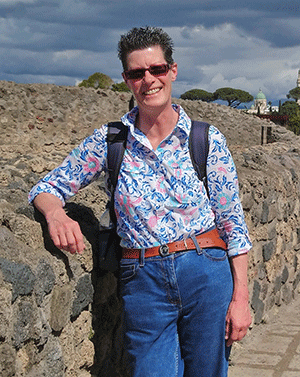Great British Retirees share their money tips
Some 10,000 people took part in the Great British Retirement Survey last year. We got in touch with a fe…
17th June 2020 15:39
by Rachel Lacey from interactive investor
Some 10,000 people took part in the Great British Retirement Survey last year. We got in touch with a few of them who have already retired and asked them to share their tips with those who are yet to make the leap

Catherine Warburton, Shrewsbury “Don’t stop saving”
“I always try to put £10 a week into a savings account. It is not much but over the years it mounts up. Now I’m retired, I find I spend less, as I really have everything I need. I am not wealthy but I manage because I have to. If I need anything I go on Freecycle or Freegle to ask for it, and if someone has what you need they will kindly donate it to you. No money changes hands. It’s a boon for people on low incomes like me.”
Michael Prior, Norfolk “Understand your pension”
“I used to lecture on corporate finance at university. I would always allocate one seminar to the UK private pension system. This was for two reasons: the first was simply that it threw up a number of interesting examples of the importance of present value; the second was that it is something you should know about.
My generation, with its defined benefit pension schemes, could relax. Your generation will have to take a more active involvement in your long-term financial future.
Steve Cann, Northumberland “Enjoy shopping around”
“If you have sufficient wealth, do you need to keep risk on the table for your investments? While interest rates are low, cash investment comes without risk.
Having an open mind about where you do your supermarket shop can save you money and shopping around can be fun, too.”
Colin Gregg, Liverpool “Pay off your loans as quickly as possible, then save”
“I am part of the last generation of public sector workers to benefit from a lifetime of saving into a defined benefit scheme, in my case the Teachers’ Pension. As an employee, you knew what you would get at retirement and could plan accordingly.
“The only certainty now is the amount you, your employer and the Government will put into your pot. What it’ll be worth when you retire is anyone’s guess.
“In the fortunate situation I am in, I have few financial worries. My pension income, together with my wife’s (ex-NHS nursing), means our household income is comfortable and we don’t have to consider too closely our, admittedly frugal, spending.
“We took several key decisions that help us maintain this good lifestyle. We paid off our mortgage as quickly as possible, 10 years ahead of the 25-year lifetime of the loan. Then we saved into our pensions and built up Isa savings.
“When we moved house on retiring, we decided to use some of our lump sum retirement benefit to install solar PV panels on the roof. This was aimed at reducing bills at the time when our income was going to take a hit, and our electricity costs have fallen by about 30%. We also installed extra insulation.
“We have been fortunate and there will be a much tougher pensions regime to navigate for future retirees. Our children are not in the same position we were in at their age. With that in mind, we’re using our Sipps as a vehicle to pass on to them via the recently altered inheritance tax rules. They are listed as the beneficiaries, which means that, assuming we don’t need the money for care in our dotage, they can benefit from an additional pension for their retirement, which will doubtless be at a later age and with less generous benefits than we’ve had.”
Alan Patrick, Hayling Island “There’s a lot of living to do after 40 years in work”

“We realised there was an awful lot of living to do after over 40 years of working, so decided to sell our house, buy an apartment in the UK and a property in sunny Spain, which could be used by ourselves and our family. This was over four years ago and was a decision that has benefited the whole family.”
Derek Bandy, London “Enjoy your hobbies”
“Do not move house if you really don’t need to. Every move erodes your wealth. Overpay your mortgage if you can. Only use credit cards that are free and give you something back and pay them off in full each month. Enjoy a hobby that keeps you fascinated and your brain active.”
Brian Phillips, Cranfield “Keep active and get involved with your community”
“Keep active going out and meeting people and getting involved with your community.
“Both myself and my wife are busy running dances and also attend other dances. This keeps us very active and we give to charity any money raised from the dances we run.”
Gillian Tesseyman, Knaresborough “Get into the savings habit early”
“My main money tip is to start saving early. It then becomes a habit and second nature.
“My first job was working in Woollies on a Saturday at the age of 16, serving biscuits and sweets with scoops, by weight, cutting cheese with a wire at the deli counter, and having lunch in the canteen. I loved it and it gave me a kick to invest some of my earnings in a savings account, which started the saving bug.
“Now 63 and retired, I have health problems so make the most of every day, appreciating my time and, luckily, I am debt-free.”
Jean Papworth, Isle of Wight “I wish I had been forced to save”

“I wish I was forced to start a pension when I began work at 16. If I had, I would not be worried now. I didn’t start saving into a pension until I was 30, I had a small pension that built up through a previous employer and I invested that at the same time I started working for a well-known supermarket. I was able to join their pension scheme, but I was in my mid-30s by then.
“I always thought my job would be safe, but the firm decided to restructure and, as I hated my job, I asked for redundancy so I could look for work to suit me.
“I got my redundancy and a reasonable payout and, as I was 55, I was able to get my pension from the supermarket. I looked for part-time work, but it wasn’t easy. Also, my elderly mother needed caring for. I get benefits now so that helps a bit, but we have to watch the pennies closely.
“The pension I paid into is still growing, albeit very slowly, but I have to wait until I’m 66 (I’m nearly 61) to get my state pension, so times are hard but I get by. I still pay into it while I can, but every month is a struggle. My mother gets a couple of pensions, so that helps.
“The moral of this story is please pay into a pension as soon as you start work as it will be needed when you get to retire, especially if you want a good income at retirement.”
Lyn Jarvis, Peterborough “Claim the marriage allowance”
“If you are married and your personal pension income is below the income tax level, your spouse (as long as they pay tax) can apply for marriage allowance. This is an allowance of £1,100 against their tax, meaning they are better off by £18 a month. My husband passes this to me.
“The U3A is a national organisation for retired or semi-retired people. We’re lucky in Peterborough to have about 150 activity groups, all run by volunteers. Examples are American square dancing, walking groups, indoor bowling, card games, writing, languages, tea dances, reading, singing, walking football and Rummikub. Membership costs are minimal or even nothing. They also organise theatre trips and holidays.”
This feature first appeared in our sister magazine, How to Retire in Style, before the coranavirus outbreak.
Andrew McQuillan, Surrey “Make the most of family”
“I retired four years ago at 67 after a long international career managing manufacturing and sales companies for British, German and US corporations. As I travelled a lot, the last thing I wanted to do in retirement was spend any more time hanging around at airports. Travelling is a usual response you hear from people when asked what they want to do when they retire, but not one you would get from me. I missed an awful lot of seeing my son grow up, so wanted to not make the same mistake with my grandchildren.
"When I retired, my wife and I thought the house would be too big, so were considering downsizing. At the same time, my son and daughter-in-law had just had a second child and their house was too small. My daughter-in-law suggested we could perhaps sell both houses and move into one larger home together. So we set about trying to find an appropriate property.
"We live in Haslemere in Surrey, where six-bedroom houses are expensive. Although we viewed a lot we could not find one that fulfilled our needs, so in the end we decided to extend our current house. We have ended up all living together in a three-storey house with ample room for us all to be as together or separate as we wish.
"Since moving in, my son and daughter-in-law have added a further two children so I now share my retirement with four children aged one, five, nine and 10. I could not be happier.
"Financially, it is better for all of us and we don’t have any concerns about care homes and nor do my son and daughter-in-law have to worry about babysitting.
"To ensure my son and his wife feel it is their home as well as ours, they paid for the extension (effectively a three-bedroom, two-bathroom additional storey) from the proceeds of selling their house. My wife and I have gifted 50% of the property to them and have arranged this with legal advice to ensure that if we die within the next seven years, it is not seen as a gift with reservation, so there should be no inheritance tax implications.
"My wife and I pay 40% of all household expenses and my son pays 60% (my daughter-in-law doesn’t work, except, of course, for looking after four young children).
"We set up a household bank account with my wife and daughter-in-law as joint account holders. All bills, including food, phones, utilities, insurance and the running of four cars are paid through this.
"The whole thing works very well and we still have child-free space when my wife and I need a little peace and quiet.”
Take part in this year's survey and have the chance to win £1,000 or five runners-up prizes of £100 giftcards from leading retailers. Visit Moneywise.co.uk/retirement-survey.
This article was originally published in our sister magazine Moneywise, which ceased publication in August 2020.
These articles are provided for information purposes only. Occasionally, an opinion about whether to buy or sell a specific investment may be provided by third parties. The content is not intended to be a personal recommendation to buy or sell any financial instrument or product, or to adopt any investment strategy as it is not provided based on an assessment of your investing knowledge and experience, your financial situation or your investment objectives. The value of your investments, and the income derived from them, may go down as well as up. You may not get back all the money that you invest. The investments referred to in this article may not be suitable for all investors, and if in doubt, an investor should seek advice from a qualified investment adviser.
Full performance can be found on the company or index summary page on the interactive investor website. Simply click on the company's or index name highlighted in the article.